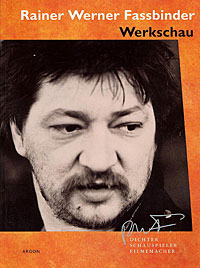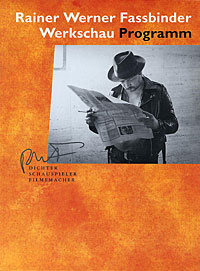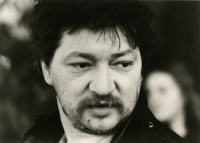
Juliane Lorenz
und Liselotte Eder
Rainer Werner Fassbinder Foundation
The RWFF, a nonprofit foundation, was established by Liselotte Eder, Fassbinder’s mother, in Munich in 1986. In 1992 its headquarters were moved to Berlin, where ever since it has been run as a private foundation by its president, Juliane Maria Lorenz. The RWFF holds all rights to Fassbinder’s artistic estate, including the rights acquired since his death. These rights cover 14 original theater plays, six adaptations, four radio plays, 44 cinema and television films, the lyrics for 12 songs, numerous early writings, and the 50 film scripts written by RWF, including 13 with co-authors.

Katalog zur Rainer Werner Fassbinder Werkschau, Berlin 1992
Many of Fassbinder’s works are now considered classics of international film and cultural history. They include films such as Katzelmacher, The Merchant of Four Seasons, The Bitter Tears of Petra von Kant, Eight Hours Are Not a Day, World on a Wire, Effi Briest, Martha, Fears Eats the Soul, Fox and His Friends, The Marriage of Maria Braun, Berlin Alexanderplatz, Lili Marleen, Lola, Veronika Voss and Querelle. 1992 saw an early highpoint in work of the RWFF with the first complete Fassbinder retrospective and an exhibition on the tenth anniversary of his death in the TV Tower on Alexanderplatz in Berlin. Titled Rainer Werner Fassbinder: Poet, Actor, Filmmaker, the exhibition attract intense media attention and was financially supported by numerous public institutions, including the German Lottery Foundation Berlin, the Berlin Senate and the State of Brandenburg, as well as many other sponsors. It also represented the first intensive collaboration between the RWFF and the German Film Institute/German Film Museum Frankfurt am Main. The event was also marked by Germany’s public television broadcasters, which devoted their best time slots to Fassbinder films. With the support of the Goethe Institute, a smaller version of the exhibition was subsequently able to tour Europe, Asia, the USA and Latin America, where it was also enthusiastically received. As the international press put it, viewers responded to Fassbinder’s films with “intrigued bafflement, shocked fascination and disarmed frustration.”

Programm zur Rainer Werner Fassbinder Werkschau, Berlin 1992
Fassbinder himself once said “When the lights go out in the film theater, the dream begins, the subconscious rules.” By 1992 at the latest it became clear that Fassbinder’s work had become an international cultural treasure. “Fassbinder is the most dazzling, talented, provocative, puzzling, prolific and exhilarating filmmaker of his generation,” wrote the New York Times in 1997, when the first complete retrospective of Fassbinder’s films opened in the Museum of Modern Art (MoMA) with a grand gala and subsequently went on to tour the USA. The enormous resonance of the retrospective led the RWFF to establish the independent and non-profit Fassbinder Foundation (FF Inc.) in New York in December 1998. While Lorenz is the sole managing director of the German non-profit RWFF, she shares the responsibility of running the FF Inc. in New York with fellow board members Laurence Kardish (until 2014 Senior Curator in the Department of Film at MoMA) and Juliane Camfield (Director of German House, New York City), who succeeded Ingrid Scheib-Rothbart in 2012. Members of the advisory board include Peter Bogdanovich, Armin Müller-Stahl, John Waters and Barbara Sukowa. The goal of the American foundation is to ensure the ongoing presence of Fassbinder’s work through the presentation of film seasons, festivals and support for scholarly projects. Both foundations also see themselves as cultural institutions promoting the creativity and innovativeness of young artists.
In 2007 Berlin Alexanderplatz: Remastered premiered at the Berlin International Film Festival. The fifteen-and-a-half-hour film, which was restored in 2K in collaboration with Bavaria Media and with the support of the German Federal Cultural Foundation, was screened as a Berlinale Special at Berlin’s prestigious Admiralspalast theater. The remastered version was the product of six years of work, and the premiere was followed by worldwide screenings, high-quality DVD editions, an exhibition at the KW Institute of Contemporary Art in Berlin and a presentation at MoMA PS1 in New York as well as the publication of an elaborately designed book (Schirmer/Mosel) curated and edited respectively by Klaus Biesenbach.
A new highpoint followed in 2010, when the restored version of Fassbinder’s two-part science fiction film World on a Wire (1973) premiered at the sixtieth Berlin International Film Festival and was subsequently issued worldwide on DVD and Blu-ray. In the summer of the same year the restored version of I Only Want You to Love Me (1976) premiered at the Munich Film Festival. And in 2011 the restored version of Fassbinder’s first English-language film, Despair, starring Dirk Bogarde, premiered at the Cannes Film Festival as part of the Cannes Classics series. Both these premieres were also followed by the worldwide release of DVD and Blu-ray editions.
In 2012 the German Theater Museum (DTM) in Munich marked the thirtieth year since Fassbinder’s death with the first exhibition dedicated to his theater work. The exhibition was titled Fassbinder: Theater and accompanied by a catalog titled Fassbinder: Theater of Provocation. The project was realized in collaboration with and with the support of the RWFF. Interest in Fassbinder’s work for the theater has been growing for some years now: in Germany, western and eastern Europe, North and South America and Asia. Moreover, since 1995 eight Fassbinder films have been adapted for the stage, works that are now part of the repertoires of renowned European theaters.
In 2013 we contributed to the project to restore Volker Schlöndorff´s film version of Bertolt Brecht’s Baal (1969), starring Rainer Werner Fassbinder and Margarethe von Trotta, which premiered in its restored version at the sixty-fourth Berlin Film Festival in 2014.
Since 2001 the RWFF has been digitizing Fassbinder’s films in an SD format using original negatives, and as a result nearly all of his films are now available on DVD. However, the digital revolution continues in the field of film technology, and in 2012 we began to prepare for the long-term preservation of Fassbinder classics in 4K in order to be able to offer our distribution partners throughout the world the highest possible quality for future distribution forms.
In 2014 the Film Society of Lincoln Center presented a comprehensive series of Fassbinder‘s films in the Walter Reade Theater, and we began the complex process of rights negotiation and financing organization required for restoration of Fassbinder’s legendary five-part, working-class series Eight Hours Are Not a Day.
On 31 May 2015 Fassbinder would have turned 70. To mark this anniversary we mounted the exhibition (in collaboration with the German Film Institute/German Film Museum) Fassbinder NOW: Film and Video Art in Berlin’s Martin-Gropius-Bau. We also presented the documentary FASSBINDER, a coproduction between the RWFF and IT WORKS! Medien. 2015 also saw the presentation of current theater productions of Fassbinder works selected by a jury for inclusion in a special section of the Berlin Theater Festival titled Focus Fassbinder. This theater event was accompanied by sold-out screenings of a selection of Fassbinder films at Berlin’s Arsenal cinema and a Fassbinder homage by the French-German TV broadcaster ARTE. The anniversary year was also marked by the publication of the book Hinter den Bildern die Welt – Die untergegangene Bundesrepublik in den Filmen von Rainer Werner Fassbinder (Behind the Images, the World. The lost Federal Republic of Germany in the films of Rainer Werner Fassbinder) by Antje Vollmer and Hans-Eckardt Wenzel.
2016 has so far seen the beginning of work on the restoration of Eight Hours Are Not a Day and the premiere at Strasbourg’s National Theater of theater-maker and author Falk Richter’s play Je suis Fassbinder, which has attracted high praise from Le Monde and has gone on to tour France. In addition, on 31 May Schirmer/Mosel published its illustrated catalog of Fassbinder’s films, R.W. Fassbinder. Illustriertes Werksverzeichnis. Die Filme.
Further information : www.fassbinderfoundation.de 31.05.2016
